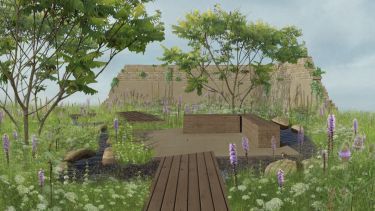- Eight aspiring landscape architects from the University of Sheffield are exhibiting at this year’s the RHS Flower Show Tatton Park
- The students will be showcasing in the Young Designer and Long Borders categories which celebrate wellbeing, sustainability and biodiversity
- Their ambitious designs provide inspiration for gardeners to explore sensory and edible planting in their own spaces
- The gardens give aspiring designers a platform to boost their careers and gain recognition from the RHS for their creativity
Eight aspiring landscape architects from the University of Sheffield will be showcasing garden designs at this year’s RHS Flower Show Tatton Park.
The event, which takes place from 19-23 July at the historic Cheshire estate, will feature renowned garden designers, as well as up-and-coming young stars who create ambitious green spaces to provide inspiration for visitors to take home to their own gardens.
This year the University of Sheffield has eight young designers who have secured a place at the prestigious annual flower show, which is focusing on green spaces for local communities and the environment of the North West.
Ollie Pike and Camellia Hayes, Masters students from the University of Sheffield’s Department of Landscape Architecture, secured two of the three Young Designers entries at the show and are both vying for the gold medals that could launch their career to new heights.
Based on an inner city pocket park, the garden being exhibited by 28 year old Camellia is called ‘Seeking Resilience’. She used the unique opportunity to have full control over the design process for the first time, to showcase how both people and nature can experience respite in an urban environment.
She said: “The garden is a space where people can recover and rest from the stresses of life, immersed and surrounded by resilient nature.
“What I like most about this garden style is the presence of species you might not have designed into your garden but instead of weeding them out, why not leave them and see what happens? This is really what ‘Seeking Resilience’ is about, resilient plants which exist against the odds and bring you so much unexpected joy.”
Working with the Bible Society to create the ‘Psalm 27 Garden’, 24 year old Ollie takes his inspiration from the protective spaces churchyards have provided throughout history for people to reflect on the big questions in life.
He said: “The garden takes inspiration from the native meadow style planting often found in churchyards to reflect the beautiful textures, calming soft colours and stages of beauty and hope in the life cycle of the natural world.
“The garden replicates the kind of environment that will give people the peace, sense of protection and courage to reflect on the stories and lessons we experience throughout life, messages all found within Psalm 27.”
A further six students are creating three gardens for the Long Borders category, which allow them to get creative with planting, and share important insights in garden design with thousands of visitors.
Camellia and Oliver’s gardens demonstrate the amazing creativity fostered with the students of the University of Sheffield’s Department of Landscape Architecture, but exhibiting at a prestigious RHS show is also a platform for up-and-coming designers to also address issues of wellbeing, sustainability and biodiversity that can bring value and life into public green spaces.
Flipping the concept of the trend for sensory planting and gardens, ‘Plants That Sense: A Living Laboratory’ from Masters student Sarah Collings, will show visitors how the plants they can use in their own gardens use their senses to adapt to the environment around them.
She said: “My design took inspiration from both Darwin’s botanical research and more modern science, to show how plants also sense us, animals, insects and respond to the stimuli around them.
“My objective in creating this design was really to share with the public how plants are not just decorative objects for our gardens, but that we can understand and connect to them as sensory beings and through that, foster a resolve to protect and support our natural world.”
Undergraduates Melissa Gün, Elena Jarmalavičiūtė and Pinru Chen created ‘Bubbling Box’, an experience designed for all the senses, including sounds, textures, sights and smells. The planting scheme was designed to show visitors how they could make their borders attractive to people, as well as wildlife with joyful and colourful mound forming planting that contains edible plants as well as scented and herb species to attract good pollinators.
Nea Weston and Helena Bills, both students on a Year in Practice - working in industry as part of their studies - are working together to show visitors how companion planting is used to reduce pests and diseases when growing edible plants. Their planting scheme for ‘Grow Together’ will showcase a garden that is edible as well as beautiful and resilient in nature.
Helena said: “Our design grows with the current trend of gardening becoming more sustainable, how a garden can have purpose, encourage biodiversity, as well as being pretty.”
To find out more about seeing the gardens on show from University of Sheffield students at RHS Tatton Park Flower Show, visit: https://www.rhs.org.uk/shows-events/rhs-flower-show-tatton-park





